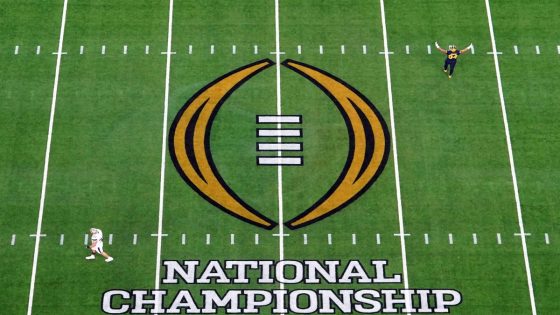I still believe Oklahoma State would have beaten LSU for the 2011 national title — if they’d gotten to play instead of America having to sit through that awful Alabama-LSU rematch.
I don’t know how UCF would have fared in 2017, but I’m still mad the self-declared national champions never got to find out.
The same is true of undefeated TCU in 2010, which led Big Ten co-champion Wisconsin for almost the entirety of its Rose Bowl victory as the powers that be winced watching a — gasp! — Mountain West team compete in The Granddaddy of Them All.
Putting Ohio State in the College Football Playoff ahead of Big 12 co-champions TCU and Baylor in 2014 was defensible — especially after the Buckeyes won the whole thing — but the Horned Frogs and Bears were national title-caliber teams denied the opportunity to prove it.
These are arguments that stand the test of time. They happened a decade or more ago and persist.
Why? They’re built around the two most tantalizing words in the English language: What if?
The 12-team Playoff brings lots of benefits. The biggest and best benefit: More games have more relevance in the national title picture than ever before. Last week’s Alabama-LSU game had massive stakes. So did Ole Miss’ win over Georgia.
Those games are mostly afterthoughts in the four-team Playoff era.
But above all, I’m excited for the death of “what-if” debates surrounding the national title. College football has always been a sport built around debates and shaping narratives. It makes for compelling content and entertainment, but for those looking to crown an undisputed champion, the system couldn’t be worse.
Human polls voted on by media members and coaches used to carry heavy influence on who won or played for national titles before and after the Bowl Championship Series.
In the Playoff era, that responsibility shifted to 13 people meeting in a hotel conference room in Grapevine, Texas.
Sometimes there are more than four teams that deserve to play for a national title. Last season, Georgia was the best team in the country for most of the regular season. Then it lost to Alabama in the SEC title game and was banished to the Orange Bowl, excluded from a Playoff it absolutely could have won.
What if the Dawgs had gotten in?
We never have to ask what if about national titles again.
And while I agreed with the committee’s belief that Florida State would have been flattened in the Playoff without quarterback Jordan Travis, denying the Seminoles a Playoff opportunity as an undefeated ACC champion is the greatest injustice the committee ever committed against the sport.
There will still be plenty of debate. There’s still almost a month to go before Selection Sunday. People will be mad, surely. Seeding and rankings will be a factor. Did a team get screwed out of a home game in the first round? Did one team have an easier road than others because of upsets or matchups?
The 13th team will be furious. And its complaints will sound a whole lot like the 69th team on Selection Sunday in basketball. We might entertain them for a bit, but they’ll quickly become an afterthought as the sport revs up for a postseason unlike any we’ve ever seen in the sport.
Debate isn’t dead. But debate over whether a champion earned that title is over forever.
There are not and have never been 13 teams in any season that deserve a chance to compete for a title. At most, there are six or seven in a spectacularly deep year. This year looks like one of those years, a perfect year for an expanded Playoff.
And it’s all going to be settled on the field.
Maybe Tennessee gets left out at 10-2. It won’t get left out if it beats Georgia on Saturday. If it loses, is a 10-2 team with one Top 25 win and a loss to Arkansas not getting a chance to play for a title a grand transgression?
Army is undefeated, but the Black Knights will play for their opportunity on Nov. 23 at Yankee Stadium. Beat Notre Dame, and the conversation about inclusion gets real. Lose, and they had their shot to prove themselves against a laughably bad schedule. They weren’t denied a chance to play for a title, they didn’t take advantage of their opportunity on a neutral field.
Miami might win the ACC. If it doesn’t, there’s a shot the Hurricanes are the first team left out of the field. Does the best team in America go down 25 points to Cal, fall behind double digits to Duke and need a fortunate review of a Hail Mary to beat Virginia Tech? One more loss for the Hurricanes, and I’m more than fine denying them a chance to play for the big trophy.
Every team that deserves to compete for a title will get to do so. A few others that don’t will get a shot, too. If a team is who it believes it is, they’ll prove it on the field after the 12-team bracket is set. At that point, opinions are irrelevant. Players and coaches decide.
College football’s postseason has always been nonsensical. Traditionalists point to the sport’s regionality and argue that the entire concept of a “national title” was barely a thing until recent decades. Winning the conference was the thing. Playing in the Rose Bowl or Orange Bowl was the thing.
That’s true. And it’s also very stupid.
We should be crowning the best team in the sport every year. It’s a good chunk of the reason to play the sport in the first place. And it always infuriated me to see deserving teams not get a chance to prove they were worthy on the field.
Some of the debates were fun. Most of them were infuriating. And whether you liked or hated them, no one watches sports for debates. It’s why Stephen A. Smith yelling on ESPN, as popular as he is, still pales in comparison to the actual games he’s talking about.
There’s nothing wrong with a little debate. There’s a lot wrong with a season leaving behind a debate of whether a national champion deserved their trophy.
Those days are gone.
Good riddance.
(Photos: James Lang / USA Today)





